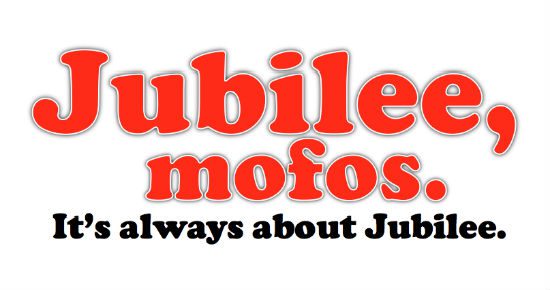Let’s start by saying that Robert F. Smith has done a beautiful thing: “Speaker stuns 2019 Morehouse grads, to pay off student debt.”
A billionaire technology investor stunned the entire graduating class at Morehouse College when he announced at their commencement Sunday that he would pay off their student loans — estimated at up to $40 million.
Robert F. Smith, this year’s commencement speaker, made the announcement while addressing nearly 400 graduating seniors of the all-male historically black college in Atlanta. Smith, who is black, is the Founder and CEO of Vista Equity Partners, a private equity firm that invests in software, data, and technology-driven companies.
“On behalf of the eight generations of my family that have been in this country, we’re gonna put a little fuel in your bus,” the investor and philanthropist told graduates in his morning address. “This is my class, 2019. And my family is making a grant to eliminate their student loans.”
… Though college officials could not provide an estimate of the exact amount owed by the current graduating class, students graduate with an average debt of $30,000 to $40,000, said Terrance L. Dixon, vice president of enrollment management.
Jubilee is always a beautiful thing.

And that’s the first thing we should do in response to this story — we should celebrate the sheer joyous beauty of it. It was a Good Thing that will make possible other Good Things that might otherwise have been impossible.
Errin Haines Whack’s report captures what this means for just one student:
In the weeks before graduating from Morehouse on Sunday, 22-year-old finance major Aaron Mitchom drew up a spreadsheet to calculate how long it would take him to pay back his $200,000 in student loans — 25 years at half his monthly salary, per his calculations.
In an instant, that number vanished. Mitchom, sitting in the crowd, wept.
“I can delete that spreadsheet,” he said in an interview after the commencement. “I don’t have to live off of peanut butter and jelly sandwiches. I was shocked. My heart dropped. We all cried. In the moment it was like a burden had been taken off.”
His mother, Tina Mitchom, was also shocked. Eight family members, including Mitchom’s 76-year-old grandmother, took turns over four years co-signing on the loans that got him across the finish line.
“It takes a village,” she said. “It now means he can start paying it forward and start closing this gap a lot sooner, giving back to the college and thinking about a succession plan” for his younger siblings.
No one would advise a 22-year-old to buy a house with a mortgage that would require half of their salary for the next 25 years. But it has become conventional wisdom to encourage young people to take on that kind of massive, life-defining debt to pay for a college education. This is madness.
Tina Mitchom’s language — “paying it forward” and “giving back” — literally points us in the direction of the larger questions we need to be asking and the unspoken assumptions at work here in this lovely story. That language reminds us of what Jubilee really means — not just the cancellation of debt, but the rejection of its legitimacy.
“Benevolent billionaire pays off students’ debt” is a framework that presumes several facts not in evidence. It presumes the legitimacy of that debt and the legitimacy of the category “benevolent billionaire.” And both of those presumptions are extremely presumptuous.
When we commend wealthy philanthropists for “giving back” we murkily acknowledge something we’ve been trying hard to forget. “Give it back” is not usually a phrase we apply to an action we see as supererogatory or generous. It is, rather, an expectation of what is due. To give something back is to return it to those from whom it was taken, whether directly or indirectly.
“Whoever has two coats must share with anyone who has none,” John the Baptist taught. The early Christians built on that to say that “your” second coat is not “yours” at all — it belongs, rightfully, to anyone who has none. Superfluity is theft. This is what all Christians taught and believed, for centuries, from the apostles up until and including Augustine.
Saint Ambrose put it this way: “You are not making a gift of what is yours to the poor person, but you are giving them back what is theirs. You have been appropriating things that are meant to be for the common use of everyone. The earth belongs to everyone, not to the rich.”
And this doctrine has not been abandoned or forgotten completely. The Catholic principle of the “universal destination of goods” has gotten a bit more … let’s say sophisticated, but the link there will take you to this section of the Catechism of the Catholic Church at the official Vatican website:
2403 The right to private property, acquired by work or received from others by inheritance or gift, does not do away with the original gift of the earth to the whole of mankind. The universal destination of goods remains primordial, even if the promotion of the common good requires respect for the right to private property and its exercise.
2404 “In his use of things man should regard the external goods he legitimately owns not merely as exclusive to himself but common to others also, in the sense that they can benefit others as well as himself.” The ownership of any property makes its holder a steward of Providence, with the task of making it fruitful and communicating its benefits to others, first of all his family.
2405 Goods of production – material or immaterial – such as land, factories, practical or artistic skills, oblige their possessors to employ them in ways that will benefit the greatest number. Those who hold goods for use and consumption should use them with moderation, reserving the better part for guests, for the sick and the poor.
That “first of all his family” bit is a reference to the principle of subsidiarity — something I think Robert F. Smith demonstrated for us in both choosing Morehouse as the location for his “giving back,” and in his admonishing the Class of 2019 to receive this as an obligation to “pay it forward.”
We can understand Smith’s act both as a generous gift and as the fulfilling of the obligation to “give back.” His act was generous in that it was uncoerced and uncompelled by anything outside of his own choice to do it, but it seems Smith himself recognized that he was obliged to act. That’s why he told the recipients of his generosity that they were, themselves, obliged to “pay it forward.” This obligation — “freely ye have received, freely give” — is more legitimate and more true than whatever obligation those students may have had to pay back their student loans multiple times over in fees and interest.
Since we quoted that bit from the Catholic catechism above, we shouldn’t neglect the paragraph that follows it:
2406 Political authority has the right and duty to regulate the legitimate exercise of the right to ownership for the sake of the common good.
Or, in other words, “We the people” — the political authority here in the US — have the right and duty and opportunity to do for every college student in America what Robert F. Smith just did for one class at Morehouse. Morehouse’ president, David A. Thomas, gives a hint of how revolutionary and transformative that could be for everyone in this country:
“Many of my students are interested in going into teaching, for example, but leave with an amount of student debt that makes that untenable,” Thomas said in an interview. “In some ways, it was a liberation gift for these young men that just opened up their choices.”
That is, again, a beautiful thing. Jubilee means more choices, more freedom.
Perhaps that freedom will allow some newly debt-free young Morehouse graduate the opportunity to imagine and to bring about a world in which education doesn’t have to be a massively expensive, debt-incurring proposition sometimes mitigated by the arbitrary intervention of occasionally benevolent billionaires paying it off or helping some few escape it by endowing scholarships.
Thomas’ understanding of what this debt-cancellation will mean for the Class of 2019 is, I think, richer than what Dylan Matthews discusses in his Vox piece “Morehouse’s student loan forgiveness is an incredibly useful economics experiment.” He writes:
You would not expect there to be profound differences between the composition of the Morehouse graduating class of 2019 and that of the class of 2018 before them, or the class of 2020 after them. These are groups of students who applied to and chose to attend the same college, at roughly the same period in history. They’re not identical groups, but they’re extremely similar.
That enables economists … to conduct an analysis 10-15 years from now comparing the incomes, indebtedness, graduate attainment, etc. of members of the class of 2019 to those of the classes of 2018 and 2020. If incomes are markedly higher for 2019ers a decade after graduation than they are for 2018ers, that’s a strong indication that debt relief increases incomes later in life.
That’s fine. But “incomes later in life” may be the least interesting and least consequential measurement for the impact of this “experiment.” It doesn’t just afford these graduates the opportunity to pursue greater income, it affords them the opportunity not to do that. They are now free to become teachers — or artists, or scholars, or honest politicians, or any other noble pursuit that isn’t all about the money. They are now free to pursue some good other than making as much money as they can because their debt forbids them from ever doing anything else.
(That disagreement aside, the concluding section of Matthews’ piece is quite good and very important.)















